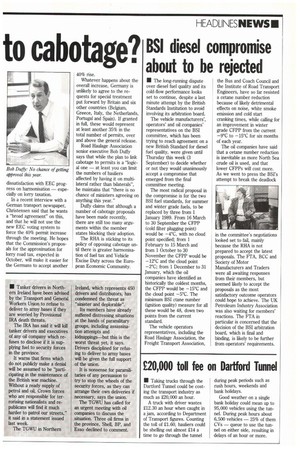BSI diesel compromise about to be rejected
Page 7

If you've noticed an error in this article please click here to report it so we can fix it.
si The long-running dispute over diesel fuel quality and its cold-flow performance looks set to continue, despite a last minute attempt by the British Standards Institution to avoid involving its arbitration board.
The vehicle manufacturers', operators' and oil companies' representatives on the BSI committee, which has been trying to reach agreement on a new British Standard for diesel fuel quality, were given until Thursday this week (3 September) to decide whether or not they would unanimously accept a compromise that emerged from the final committee meeting.
The most radical proposal in the compromise is for the two BSI fuel standards, for summer and winter grade fuels, to be replaced by three from 1 January 1989. From 16 March to 30 September the CFPP (cold filter plugging point) would be —4°C, with no cloud point specified; from 1 February to 15 March and from 1 October to 30 November the CFPP would be —12°C and the cloud point —2°C; from 1 December to 31 January, which the oil companies have identified as historically the coldest months, the CFPP would be —15°C and the cloud point —5°C. The minimum BSI ctane number (ignition quality) measure for all these would be 48, down two points from the current standard.
The vehicle operators representatives, including the Road Haulage Association, the Freight Transport Association, the Bus and Coach Council and the Institute of Road Transport Engineers, have so far resisted a cetane number reduction because of likely detrimental effects on noise, white smoke emission and cold start cranking times, while calling for an improvement in winter grade CFPP from the current —9°C to —15°C for six months of each year.
The oil companies have said that a cetane number reduction is inevitable as more North Sea crude oil is used, and that lower CFPPs will cost more. As we went to press the BSI's attempt to break the deadlock in the committee's negotiations looked set to fail, mainly because the RHA is not prepared to accept the latest proposals. The FTA, BCC and Society of Motor Manufacturers and Traders were all awaiting responses from their members, but seemed likely to accept the proposals as the most satisfactory outcome operators could hope to achieve. The UK Petroleum Industry Association was also waiting for members' reactions. The FTA in particular is concerned that the decision of the BSI arbitration board, which is final and binding, is likely to be further from operators' requirements.




























































































